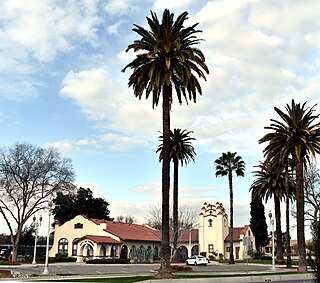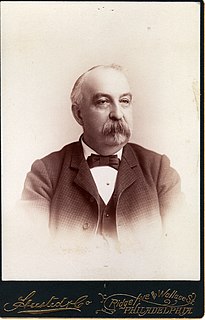The Communications Decency Act of 1996 (CDA) was the United States Congress's first notable attempt to regulate pornographic material on the Internet. In the 1997 landmark case Reno v. ACLU, the United States Supreme Court struck the act's anti-indecency provisions.
Eldred v. Ashcroft, 537 U.S. 186 (2003), was a decision by the Supreme Court of the United States upholding the constitutionality of the 1998 Sonny Bono Copyright Term Extension Act (CTEA). The practical result of this was to prevent a number of works from entering the public domain in 1998 and following years, as would have occurred under the Copyright Act of 1976. Materials which the plaintiffs had worked with and were ready to republish were now unavailable due to copyright restrictions.

Perris is a city in Riverside County, California, United States, located 71 miles (114 km) east-southeast of Los Angeles, California, and 81 miles (130 km) north of San Diego, California. It is known for Lake Perris, which hosts a variety of flora and fauna. The city is most widely recognized for having many choices involving aerial activities, such as skydiving and hot-air ballooning. Perris is within the Inland Empire metropolitan area of Southern California. Perris had a population of 80,067 as of the 2020 census.

The Internet Archive is an American digital library with the stated mission of "universal access to all knowledge". It provides free public access to collections of digitized materials, including websites, software applications/games, music, movies/videos, moving images, and millions of books. In addition to its archiving function, the Archive is an activist organization, advocating a free and open Internet. As of February 2022, the Internet Archive holds 34,205,294 books and texts, 7,606,196 movies, videos and TV shows, 815,791 software programs, 14,133,383 audio files, 4,124,371 million images, 1,259,875 media collections, 2,321,000 TV clips, and 663 billion web pages in the Wayback Machine.

Sanborn maps are detailed maps of U.S. cities and towns in the 19th and 20th centuries. Originally published by The Sanborn Map Company (Sanborn), the maps were created to allow fire insurance companies to assess their total liability in urbanized areas of the United States. Since they contain detailed information about properties and individual buildings in approximately 12,000 U.S. cities and towns, Sanborn maps are valuable for documenting changes in the built environment of American cities over many decades.

The Constitution of California is the primary organizing law for the U.S. state of California, describing the duties, powers, structures and functions of the government of California. California's original constitution was drafted in both English and Spanish by American pioneers, European settlers, and Californios and adopted at the 1849 Constitutional Convention of Monterey, following the American Conquest of California and the Mexican-American War and in advance of California's Admission to the Union in 1850. The constitution was amended and ratified on 7 May 1879, following the Sacramento Convention of 1878-79.

Robert Brian Gibbs is an American farmer and politician serving as the U.S. representative for Ohio's 7th congressional district. He is a member of the Republican Party.

Baker v. Selden, 101 U.S. 99 (1879), was a leading Supreme Court of the United States copyright case cited to explain the idea-expression dichotomy.
Wilkerson v. Utah, 99 U.S. 130 (1879), is a United States Supreme Court case in which the Court affirmed the judgment of the Supreme Court of the Territory of Utah in stating that execution by firing squad, as prescribed by the Utah territorial statute, was not cruel and unusual punishment under the Eighth Amendment to the United States Constitution.
Feist Publications, Inc., v. Rural Telephone Service Co., 499 U.S. 340 (1991), was a decision by the Supreme Court of the United States establishing that information alone without a minimum of original creativity cannot be protected by copyright. In the case appealed, Feist had copied information from Rural's telephone listings to include in its own, after Rural had refused to license the information. Rural sued for copyright infringement. The Court ruled that information contained in Rural's phone directory was not copyrightable and that therefore no infringement existed.
The Copyright Law of the United States grants monopoly protection for "original works of authorship". With the stated purpose to promote art and culture, copyright law assigns a set of exclusive rights to authors: to make and sell copies of their works, to create derivative works, and to perform or display their works publicly. These exclusive rights are subject to a time limit, and generally expire 70 years after the author's death or 95 years after publication. In the United States, works published before January 1, 1927, are in the public domain.
The Trade-Mark Cases, 100 U.S. 82 (1879), were a set of three cases consolidated into a single appeal before the United States Supreme Court, which in 1879 unanimously ruled that the Copyright Clause of the Constitution gave Congress no power to protect or regulate trademarks. Congress then passed the Trade Mark Act of 1881, which was based on the Commerce Clause power, and therefore passed constitutional muster.
Pro se legal representation comes from Latin pro se, meaning "for oneself" or "on behalf of themselves", which in modern law means to argue on one's own behalf in a legal proceeding as a defendant or plaintiff in civil cases or a defendant in criminal cases.

Natrona is an unincorporated community in Harrison Township, Allegheny County in the U.S. state of Pennsylvania. It is located in western Pennsylvania within the Pittsburgh Metropolitan Statistical Area, approximately 24 miles (39 km) northeast of Downtown Pittsburgh. Natrona is situated along the Allegheny River at Lock and Dam Four, Pools Three and Four between Brackenridge, Natrona Heights, Karns, Allegheny Township, and Lower Burrell.

Riverside County is a county located in the southern portion of the U.S. state of California. As of the 2020 census, the population was 2,418,185, making it the fourth-most populous county in California and the 10th-most populous in the United States. The name was derived from the city of Riverside, which is the county seat.

The Copyright Act of 1831 was the first major revision to the U.S. Copyright Law. The bill is largely the result of lobbying efforts by American lexicographer Noah Webster.
Merrell v. Tice, 104 U.S. 557 (1881), was a United States Supreme Court ruling dealing with copyright. At the time, a prerequisite for having a copyright was delivering two copies of the material to the Library of Congress within a time limit. Tice sued Merrell for copyright infringement and the lower courts were sympathetic; he just had to prove that he had observed that prerequisite. As evidence, Tice presented notes purportedly from the Library of Congress that certified that he had sent the book to the Library on time. Appeals of the case eventually landed it in the Supreme Court.

Ernst Emil Julius Ferdinand Hexamer was a German-born American civil engineer. He was known as originator of a system of fire insurance maps, which by the time of his death were used by fire insurance companies in all parts of the world.










